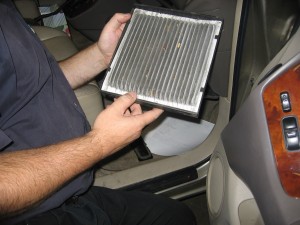Many car owners have never even heard of a cabin air filter and would have no idea when it needs to be replaced if they had! Hopefully the information here will answer the questions you might have about this unknown filter.
A cabin air filter is a part of your car’s ventilation system that removes pollutants from the air before they can enter the passenger compartment. Cabin air filters can also be referred to as pollen or dust filters, interior ventilation filters, ACC filters, or passenger compartment filters. A cabin air filter purifies the air as well as protecting the heater and AC components. If the cabin air filter is dirty or clogged, the heating or air conditioning performance will suffer as well as the inside air filtration. When this filter looses its effectiveness, you might notice unpleasant odors or reduced air flow from the cabin vents. It is recommended to replace this filter at least once a year or every 12,000 to 15,000 miles. It should be replaced more often if your car is driven in places with heavy pollution or dusty conditions. Two types of filters are offered for replacement, single stage and multi-stage filters. Single stage filters trap dust, large soot, and allergens. Multi-stage filters use activated carbon that reduces toxic gases and odors as well as dust and allergens. Multi-stage filters are usually the better quality filter and more often recommended.
This filter is a relatively new feature and not all vehicles have one. If you own a 2000 or newer car, it probably has one. Cars and trucks in the U.S. began using cabin air filters around 1995, so check your owner’s manual or talk to your repair technician. Most repair technicians will be able to tell you whether or not your vehicle has one. The ease or difficulty of replacing the filter depends on the make and model of your vehicle. You might have to have it replaced by a technician. Once you know whether your car is equipped with one or not, then you’ll know if you need to add” check cabin air filter” to the list the next time your car is serviced!


Leave a Reply
You must be logged in to post a comment.